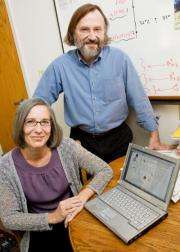Scientists' strategic reading of research enhanced by digital tools

The revolution in scientific publishing that has been promised since the 1980s is finally about to take place, according to two University of Illinois experts in information science.
Allen H. Renear and Carole L. Palmer, professors of library and information science at Illinois, say that as techniques originally designed to organize and share scientific data are integrated into scientific publishing, scientists' long-standing practice of reading "strategically" will be dramatically enhanced.
"Although it's natural to think that scientists search online to find individual articles to read, that isn't usually what's going on," Renear said. "Researchers actually try to avoid reading as much as possible, relying instead on indexing, citations and peer recommendations as indicators of scientific relevance."
"Scientists skim journal articles to discover valuable information. They scan for terminology, segments, diagrams and summaries of particular interest. But they don't read individual articles left-to-right, top-to-bottom."
As the quantity of information that must be covered grows rapidly, Renear says efficient strategic reading becomes increasingly critical in scientific work.
In today's electronic environment, powerful new tools are emerging that support strategic reading, allowing scientists to work with large numbers of articles simultaneously without having to read them in their entirety.
These tools are possible thanks to ontologies, which the authors describe as "structured terminologies for representing scientific data."
Originally designed to support the sharing and analysis of data, ontologies can provide information such as unambiguous identification of terms and relationships, and implicit background knowledge, the researchers say.
Scientists using these tools will be "speaking a language that can also be understood by computers, so computers can assist them as they make their way through text," Renear said.
The change in reading practices among scientists will also shape the future of scientific publishing.
"The way most journal articles are currently re-produced in electronic form is still as more or less non-functional versions of printed pages - basically, just a piece of paper lying dead on the screen," Renear said.
Instead of the electronic version simply imitating the print version of the article, integrating ontologies into the online versions of scientific literature will create many possibilities, including allowing text, diagrams and data in documents to be connected to databases of contemporary scientific knowledge.
The networked journal article will become a rich interactive representation of current scientific knowledge, available for automatic computer processing and optimized for the rapid and high-volume strategic reading scientists actually practice, Renear said.
Although automated information extraction and text mining of scientific literature, which are also supported by ontologies, will be increasingly important techniques for dealing with the information explosion, Palmer says they won't replace reading altogether.
"Narrative text will not disappear; the context it provides is too important," she said. "There will still be authors, and there will still be readers."
But within the sciences, the researchers say, reading will continue to be more and more strategic, and with the emergence of new reading tools, strategic reading will be more and more effective.
"Scientists want to read more, faster," Palmer said. "They want to read, relate and annotate research articles, strategically. Search and retrieval functions are important, as are automated information extraction and text mining. But tools for reading help scientists with the vital, everyday work of understanding and using the literature."
Renear and Palmer's findings were published in an article titled "Strategic Reading, Ontologies, and the Future of Scientific Publishing" in the Aug. 13 issue of Science.
Source: University of Illinois at Urbana-Champaign (news : web)















